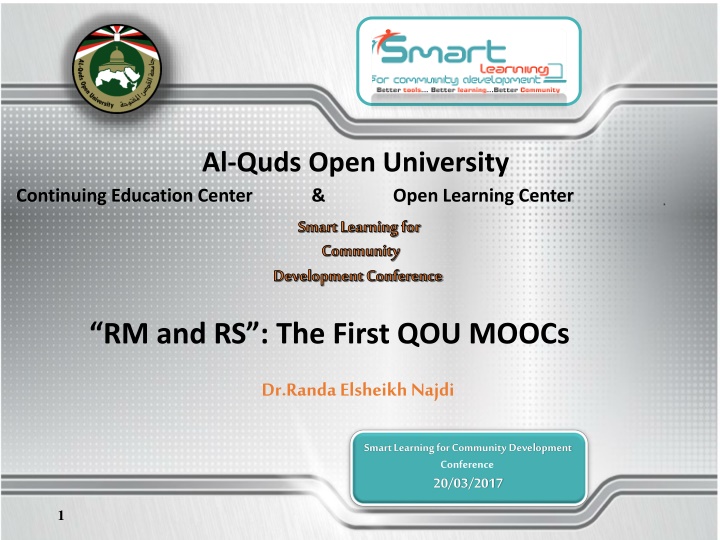
Impact of MOOCs on Higher Education Institutions
Explore the introduction of Massive Open Online Courses (MOOCs) by Al-Quds Open University and how they aim to bridge the gap between high school and university-level education, with a focus on the Remedial Math and Remedial Statistics courses. Gain insights into enrollment numbers, learner engagements, and demographic characteristics to understand the implications for higher education decision-makers.
Download Presentation

Please find below an Image/Link to download the presentation.
The content on the website is provided AS IS for your information and personal use only. It may not be sold, licensed, or shared on other websites without obtaining consent from the author. If you encounter any issues during the download, it is possible that the publisher has removed the file from their server.
You are allowed to download the files provided on this website for personal or commercial use, subject to the condition that they are used lawfully. All files are the property of their respective owners.
The content on the website is provided AS IS for your information and personal use only. It may not be sold, licensed, or shared on other websites without obtaining consent from the author.
E N D
Presentation Transcript
Al-Quds Open University & Open Learning Center Smart Learning for Community Development Conference Continuing Education Center RM and RS : The First QOU MOOCs Dr.RandaElsheikhNajdi Smart Learning for Community Development Conference 20/03/2017 1
MOOCs : MOOCs : massive open online courses. There are more than 480,000 MOOC courses .35 million participants from 196 countries, )2015( In May 2014, (QRF) launched Edraak. In 2016 :(QOU) introduced its first MOOCs called Remedial Math (RM) and Remedial Statistics (RS) through Edraak platform 2
Statement of the problem : This Article sets out to help decision makers in higher education institutions gain a better understanding of the phenomenon of Massive Online Open Courses (MOOCs) and trends towards greater openness in higher education and to think about the implications for their institutions 3
In this study we apply a descriptive lens to the first two MOOCs offered by Al Quds Open University Remedial Math (RM) and Remedial Statistics(RS) launched by Edraak platform. These courses aimed to fill the gap between high school math and university math, both courses targeting the college learners while remaining available to anyone. 4
Objectives : The objective is to provide insights into QOU developed MOOCs and the demographics diversity and characteristics of the 18,000 Arab learners enrolled 5
Data Collection & Fingings RM RS 19/07/2016 Start Date 27/12/2016 16/08/2016 End Date 24/01/2017 Remedial Level Remedial Length 4 Weeks 4 Weeks Effort 1 hour/week 1 hour/week 7
The initial enrolment in the RM course was 10,090 learners with only 237 learner withdrawals. RS course enrolment was 8,518 learners with only 100 learners withdrawals. The number of learning engagements, in RM course was 1,084 (17%) while in RS course was 1,515 (18%). These percentages are considerably high, even higher than some MOOCs offered by Stanford University where many courses have less than 10% of learning engagements, 8
Country Egypt Algeria Jordan Saudi Arabia Palestine Morocco Syria Yemen Iraq Tunisia United Emirates Other Sum RM 1,703 2,445 901 645 1,062 2,422 284 130 167 - - RS 2,548 1,680 862 748 698 571 301 226 - 146 285 Numbers of participating learners from Arab countries Arab 113 9,479 - 8,065 9
Academic Levels: RM Doctorate Masters Professional Degree913 Associate Degree Bachelor's Degree Secondary/High School Elementary/Primar y School Junior, Secondary/Junior, High/Middle School Others Sum RS 231 78 or 1,880 212 3,989 193 4,089 Number of respondents by educational attainment levels 2,991 1,785 92 36 1,296 288 1,172 10,743 267 8,769 10
Conclusion : We recommended, similar studies to be conducted in different contexts. More researches needs to focus on issues such as learners motivation and achievement retention growth through a MOOC courseMOOCs Deeply impact of Arab universities is yet to be studied. 11
Core Recommendations : Based on the quantitative (survey) and qualitative testimonials given by the learners, we can confirm that most learners over (85%) were optimistic and satisfied with the learning process in general. Many learners indicated happiness and satisfaction with the lectures, quality of animations, games, and activities provided by MOOCs (90%). 12
